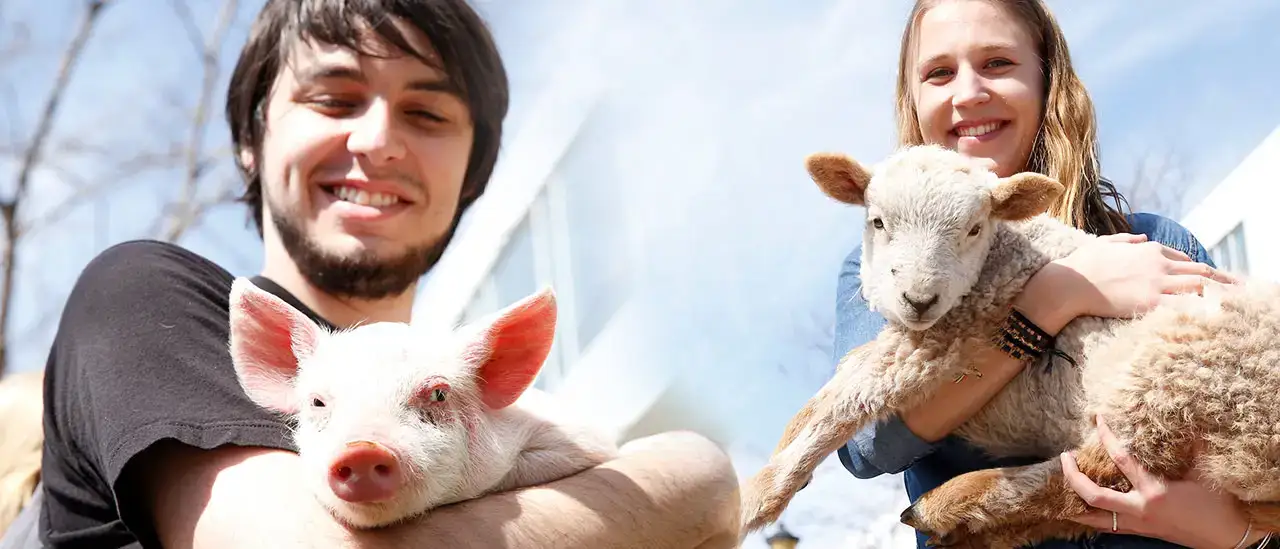SUNY Oneonta's Office of Health Careers provides specialized guidance and support for students preparing to apply to veterinary medical school to be a Doctor of Veterinary Medicine (DVM) or Veterinary Medical Doctor (VMD).
What is Veterinary Medicine?
"Veterinary medicine is the branch of medicine that deals with the prevention, diagnosis and treatment of disease as well as disease prevention in animals of all types, from family pets to farm livestock and zoo animals.
Veterinary health care workers also contribute to human public health by working to control zoonotic disease, those diseases passed from non-human animals to humans, such as Lyme disease and West Nile virus, for example.
The scope of veterinary medicine is wide, covering all animal species, both domesticated and wild, with a range of conditions that can affect different species."
- ExploreHealthCareers.org
Learn More
Acceptance Rate
53% of SUNY Oneonta applicants were accepted into DVM or VMD programs
(2021-2023 Report)
SUNY Oneonta students have recently attended the following Veterinary Medicine programs: Auburn University, Cornell University, Lincoln Memorial University, Mississippi State University, Purdue University, Ross University School of Veterinary Medicine, St. Georges University.
Prerequisite Courses & Electives
Students must consult SUNY Oneonta's current undergraduate catalog for course descriptions, prerequisites, and time of year when courses are offered to plan properly in advance.
Prerequisites for Veterinary Medicine Programs:
- BIOL 1001: Investigative Biology Laboratory
- BIOL 1002: Cellular Perspectives in Biology
- BIOL 1004: Organismal Perspectives in Biology (Preferred) or BIOL 1006: Ecological and Evolutionary Perspectives in Biology
- BIOL 2000: Cell & Molecular Biology
- BIOL 2002: Genetics
- BIOL 3106: Microbiology
- CHEM 1111: General Chemistry I
- CHEM 1121: General Chemistry II
- CHEM 2212: Organic Chemistry I
- CHEM 3222: Organic Chemistry II
- CHEM 3302: General Biochemistry or CHEM 4312: Biochemistry I
- COMM 1400: Public Speaking* (preferred) and/or COMM 1100: Introduction to Communication
- COMP 1000: Composition
- PHYS 1030: General Physics I: (Non-Calculus)
- PHYS 1040: General Physics II: (Non-Calculus)
- STAT 1010: Introduction to Statistics
A minimum grade of C or higher is typically required in each prerequisite course, however grades of B or higher are recommended. Though a strong application includes a prerequisite and overall GPA greater than 3.5, programs are seeking applicants that are well-rounded in educational and life experience and can articulate an understanding of the career and vision for themselves in the Profession.
Veterinary Medicine education programs may change course prerequisites at any time and may have additional requirements, preferences, or policies that are not reflected in this prerequisite course list or on the Summary of Course Prerequisites Chart. Programs may also allow applicants to substitute courses or choose different prerequisites. Applicants should review the program-specific details and contact programs directly to determine whether a particular course will fulfill a prerequisite.
Some programs require a 2-course sequence in Biochemistry; therefore, students should carefully review the Biochemistry Requirement at the schools to which they intend to apply before enrolling in a Biochemistry course.
Other courses recommended or required by some veterinary medicine schools include Animal Nutrition, Anatomy & Physiology, Cellular Biology, Comparative Anatomy, Histology, Mammalian Physiology, Medical Terminology, and Pre-Calculus or other Advanced Math.
Students have the responsibility to check entrance requirements for schools to which they intend to apply.
Veterinary Medicine Program Requirements
Students should regularly review the Veterinary Medical School Admission Requirements
Applicants are evaluated on:
- letters of evaluation
- leadership skills
- GPA
- GRE or MCAT
- animal care and veterinary experience
- Animal care and veterinary experience varies in both quantity and type
- students will need a minimum of 250 veterinary hours (ranging from clinical vet hours to research and involving a variety of animals).
Application Timeline
Application to veterinary school is made through the centralized application VMCAS
Quick Facts about applying to veterinary school through VMCAS and statistics of admitted students.
- The VMCAS Application Cycle opens annually in Mid-January.
- Program Selection begins annually in early May
- Application Cycle Closes annually in early-mid September.
GRE Preparation
Many Veterinary Medicine Programs require the GRE General Test.
- GRE preparation options include free and paid test prep programs
- ETS offers free and paid test prep options
- SUNY Oneonta offers discounted GRE Test Prep
Letters of Evaluation
Students generally request three to six letters of evaluation to be submitted on their behalf for veterinary medical school applications. Appropriate evaluators include science faculty, other course instructors, animal care professionals, current or former employers, and professional references.
